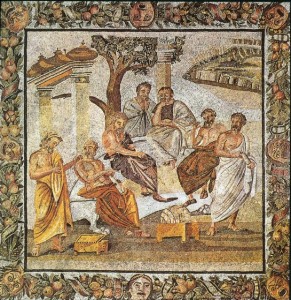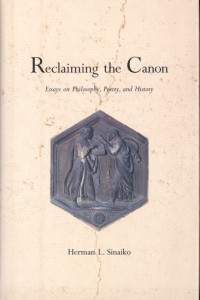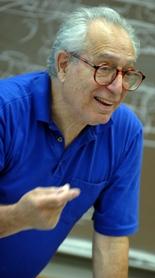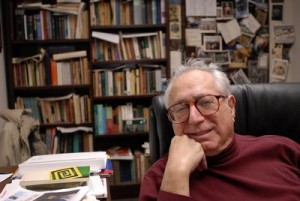 One can learn without being taught. This possibility makes conversation — dialogue — the human activity most suited to the growth of wisdom in the soul. The greatest block to learning is our ignorance of our own ignorance, our failure to realize, or to admit that we do not understand or even perceive, the problems we face. The block can be removed most effectively in a free, intimate conversation in which any participant can raise objections, demand clarification, or request further information.
One can learn without being taught. This possibility makes conversation — dialogue — the human activity most suited to the growth of wisdom in the soul. The greatest block to learning is our ignorance of our own ignorance, our failure to realize, or to admit that we do not understand or even perceive, the problems we face. The block can be removed most effectively in a free, intimate conversation in which any participant can raise objections, demand clarification, or request further information.
– Herman Sinaiko, Reclaiming the Canon
The Socratic Method and Platonic Dialectic
Beginning when Socrates was alive in Athens and continuing down to the present day, portrayals and analyses of Socrates’ habitual method of interaction have been a dozen a drachma. Plato’s portrayals, of course, are the most famous and have been the most influential historically. Indeed what has come to be known as the “Socratic Method” — the organization of a class around interactive question-and-answering rather than around broadcast lecturing — is perhaps more properly understood as the “Platonic Method”, which the author Plato put in the mouth of his character Socrates. For Plato was a philosopher in his own right and the founder of the first formal school of philosophy, The Academy, in which classes were organized around interactive question-and-answer.
 In any case, the right kind of discussion or dialogue — dialectic in Greek — appears to be uniquely transformative for inquiring minds. And it is this kind of discussion that “Socratic Method” teaching seeks to foster — and not just in law school where it has become (in)famous. My own views on the matter are largely due to the influence of a late professor of mine, Herman Sinaiko, who best expressed his own views on the matter in his book Reclaiming the Canon: Essays on Philosophy, Poetry, and History (1998). Excerpts from the beginning and ending of that book are included below.
In any case, the right kind of discussion or dialogue — dialectic in Greek — appears to be uniquely transformative for inquiring minds. And it is this kind of discussion that “Socratic Method” teaching seeks to foster — and not just in law school where it has become (in)famous. My own views on the matter are largely due to the influence of a late professor of mine, Herman Sinaiko, who best expressed his own views on the matter in his book Reclaiming the Canon: Essays on Philosophy, Poetry, and History (1998). Excerpts from the beginning and ending of that book are included below.
(N.B.: Like many things, the meaning of the term “dialectic” has evolved over time and in different shades of meaning has come to be associated with the thinking and work of Kant, Hegel and Marx, among others. In the thinking and work of Plato and Plato’s Socrates, however, the term simply means roughly “serious, open-minded, philosophical discourse”.)
Herman L. Sinaiko, “Socrates and Freud: Truth and Talk”,
Reclaiming the Canon (1998), pp. 3–5.
 Socrates and Freud — a strange pair! The ancient Athenian philosopher and the modern medical scientist — what do they have in common? In what reasonable sense could they be said to be the joint subject of a lecture? Of course, in view of the modern mania for comparing and contrasting anything and everything, Socrates and Freud are as good a pair to examine as any other. Both are major figures in the intellectual history of the West. Both were great innovators, protean thinkers whose influence has been deep and pervasive far beyond the limits of the issues they explicitly addressed. Both were deeply interested in the human psyche. But as soon as I say that, as soon as I move from abstract points of comparison to concrete subjects, the profound differences between them begin to emerge. For Socrates psyche seems to mean “soul” in all its diverse theological, poetic, and even commonplace meanings, whereas for Freud psyche takes on its characteristic and definitive contemporary sense of something like “the inner self.”
Socrates and Freud — a strange pair! The ancient Athenian philosopher and the modern medical scientist — what do they have in common? In what reasonable sense could they be said to be the joint subject of a lecture? Of course, in view of the modern mania for comparing and contrasting anything and everything, Socrates and Freud are as good a pair to examine as any other. Both are major figures in the intellectual history of the West. Both were great innovators, protean thinkers whose influence has been deep and pervasive far beyond the limits of the issues they explicitly addressed. Both were deeply interested in the human psyche. But as soon as I say that, as soon as I move from abstract points of comparison to concrete subjects, the profound differences between them begin to emerge. For Socrates psyche seems to mean “soul” in all its diverse theological, poetic, and even commonplace meanings, whereas for Freud psyche takes on its characteristic and definitive contemporary sense of something like “the inner self.”
Rather than detailing the differences between the two figures, what I want to do is focus on a single, central feature of their activity as thinkers, a feature that they share with each other and that distinguishes them from all — and I mean all — other major thinkers across the whole span of Western thought. I am referring to the peculiar emphasis both of them place upon talk, discourse, conversation, dialogue. The extraordinary focus both give to this everyday activity is well known but has been too little contemplated. Indeed, it is frequently the basis for sharp criticism of the thought of both men. You can read in many textbooks on the history of philosophy how Socrates naively thought that it was possible to arrive at true definitions of the virtues or to discover the nature of moral principles simply by talking to people. Similarly, when Freud’s method of psychotherapy is called the talking cure, that description is not always neutral or complimentary; it often contains a slight note of contempt and derision at the absurdly self-limiting discipline of psychoanalysis.
What is interesting and important to note is that both Socrates and Freud were well aware that the ends to which they devoted themselves were not usually achieved simply by talking. In Socrates’ case, the pre-Socratic tradition of Greek thought included many thinkers who were profound observers of natural phenomena as well as of human social and political affairs. Freud, too, engaged in a great deal of scientific research, in the laboratory and clinical practice, in his early career as a neurologist and psychiatrist. The truth seems to be that both men, as they matured into the great thinkers we admire, deliberately restricted their respective pursuits of philosophy and psychoanalysis to the single activity of talking. It was Socrates who brought philosophy “down out of the heavens into the marketplace” and thus defined his method of philosophical investigation as dialectic — that is, as “conversation.” It was Freud who rejected hypnosis, the laying-on of hands, and the empirical investigation of the objective facts of a case in favor of the rigorous and exclusive use of talk as the method·of psychoanalysis.
Freud was so fanatical in his emphasis on talk, nothing but talk, that he invented the technique of having patients lie on a couch while the analyst sits behind them, so that they can’t see the analyst’s face and try to read its expression. In classical psychoanalysis, except for the unavoidable few seconds at the beginning and end of each session when the patient is in the process of lying down on or getting up from the couch, the analyst is essentially a disembodied voice. The effect is very similar to what many readers feel when they read Plato’s Dialogues . Frequently a dialogue begins with a lively, highly dramatic scene; but as Socrates takes hold of the conversation the dramatic hustle and bustle fades away, and soon all that is left is the sound of two or more voices talking back and forth in a kind of temporal and spatial void.
Socrates and Freud both knew, without doubt, that in restricting philosophy and psychoanalysis to mere talk, by excluding the other possible resources available to them, they were paying a heavy price. They knew this, and yet they did it. So far as we know, neither of them ever regretted it or reversed himself.
In these remarks I want to follow their lead; I want to transform talk from a: commonplace phenomenon that we take for granted into an open question to be seriously reflected on. I will do so by looking at what Socrates and Freud each discovered about talk and what each did with and through talk. I hope thereby to begin to explore the power of talk, the way it can become not merely an important or even the primary technique but the sole instrument by which philosopher and psychoanalyst can pursue their ends.
For both Socrates and Freud the only end that counts, the end to which both of them bend their efforts, is the discovery of the truth — not a trivial truth about this or that but truth with a capital T, the truth about the nature of things.
Were they serious? Can mere talk be the privileged, the only, means to significant truth?
Herman L. Sinaiko, “Dialogue and Dialectic: The Limitations on Human Wisdom”,
Reclaiming the Canon (1998), pp. 327–330.
 I suggest that the Dialogues can most accurately be viewed as imitations of philosophy, dramatic representations of the search for wisdom. The Dialogues show who may participate in this search and under what conditions, how the search begins, what it involves, the direction it takes, and so forth. Considered in this way, the Dialogues do not so much tell Plato’s answers to the problems of politics, ethics, psychology, epistemology, and cosmology as show in images what it means to ask these questions and to look for answers. The Dialogues may not be philosophy as Plato understood it, but they do provide glimpses of what he thought the search for wisdom was like.
I suggest that the Dialogues can most accurately be viewed as imitations of philosophy, dramatic representations of the search for wisdom. The Dialogues show who may participate in this search and under what conditions, how the search begins, what it involves, the direction it takes, and so forth. Considered in this way, the Dialogues do not so much tell Plato’s answers to the problems of politics, ethics, psychology, epistemology, and cosmology as show in images what it means to ask these questions and to look for answers. The Dialogues may not be philosophy as Plato understood it, but they do provide glimpses of what he thought the search for wisdom was like.
From this point of view, the most striking aspect of Plato’s dramas is the degree to which he has anchored the abstract speculations of the participants in reality. The speakers themselves are not cardboard figures. The character of a man always corresponds to the opinions that he expresses in the Dialogues. That correspondence, however, is never perfect or exhaustive. The man is always bigger, richer in possibilities, and more interesting than his explicit statements.
[…]
Near the end of the Phaedrus Socrates describes the difficulties of an author, who, ideally, should follow his written works about as they circulate through the world so that he can answer the questions of readers and clarify their confusions. In philosophy there is no substitute for the direct, personal relationship of two or more individuals engaged in conversation.
If this description of philosophy as a form of conversation accounts for Plato’s refusal to write philosophical treatises, it does not explain his insistence on the incommunicability of wisdom. On the contrary, the identification of philosophy with conversation — the fact that Socrates, who devoted his life to the search for wisdom, spent his time talking to others, or, as his victims might put it, interrogating them — suggests that Socrates has something to learn from his interlocutors, just as they have a good deal to learn from him.
One can learn without being taught. This possibility makes conversation — dialogue — the human activity most suited to the growth of wisdom in the soul. The greatest block to learning is our ignorance of our own ignorance, our failure to realize, or to admit that we do not understand or even perceive, the problems we face. The block can be removed most effectively in a free, intimate conversation in which any participant can raise objections, demand clarification, or request further information.
Even so, the success of such a conversation is dubious at best, and in recognition of this likely lack of success, a large proportion of Plato’s works end inconclusively, if not in outright failure. Some, such as the Ion and Euthyphro, end this way because the interlocutors do not perceive the magnitude of their own ignorance. In others, such as the Protagoras, the interlocutors seem to be aware of their difficulties but prefer not to continue the discussion for personal or professional reasons. In still others, such as the Theaetetus, the interlocutors have both the intelligence to grasp the problem and the desire to find a solution, but they run out of ideas with which to continue the conversation.
William Mathews [sometimes spelled “Matthews”] L.L.D, “Literary Clubs”,
The Great Conversers: And Other Essays (1874?), pp. 51–52.
Over 100 years previously, another professor at another University of Chicago (now called the “Old” University of Chicago) the preceded the current University of Chicago put the matter thus:
The fullest instruction and the fullest enjoyment are never derived from books till we have ventilated the ideas thus obtained in free and easy chat with others.
The mental faculties demand exercise as truly as the bodily, and enjoy it as keenly. The mind that is healthy delights in the glow of movement and contest.
It loves to meet with a congenial spirit — one that has sucked the sweetness of the same authors, and enjoyed them with the same gust — which has brought away their quaint essence, and treats it to the juice of the grape without thrusting upon it the stalks and husks.
Talking is a digestive process which is absolutely essential to the mental construction of the man who devours many books. A full mind must have talk, or it will grow dyspeptic.
Sir William Hamilton used to say that a man never knows anything until he has taught it in some way; it may be orally, or it may be in writing a book. It is equally true that many authors have talked better than they have written. Philosophers tell us that knowledge is precious for its own sake; that it is its own exceeding great reward. But experience tells us that knowledge is not knowledge until the use of it; that it is not ours until we have brought it under the dominion of the great social faculty — speech. Solitary reading will enable a man to stuff himself with information; but without conversation his mind will become like a pond without an outlet — a mass of unhealthy stagnature.
It is not enough to harvest knowledge by study; the wind of talk must winnow it, and blow away the chaff; then will the clear, bright grains of wisdom be garnered for our own use or that of others.
Then let us talk; and that our talk may be a true recreation, let us talk with congenial spirits. Such spirits may be met with singly in the ordinary intercourse of life, but the full play of the mind demands that they should be encountered, “not in single spies, but in battalions;” and hence the necessity of clubs to bring together, like steel filings out of sand at the approach of a magnet, men of the most opposite pursuits and tastes, the attrition of whose minds may brush away their rust and cobwebs, and give them edge and polish.
“Aha!” Moments of Discovery
To a large extent it all comes down to facilitating students’ “Aha!” moments of discovery. Kinda like this (seriously! 😊):
You must be logged in to post a comment.